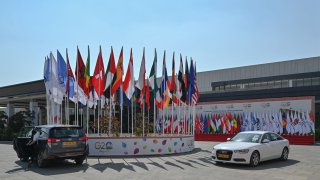
- France's finance minister told CNBC that additional sanctions are being considered against Russia for its unjustified war against Ukraine, as current measures have proven to be "very efficient."
- "We are in the process of defining these new sanctions. For the time being, I just want to insist on the fact that sanctions that have been already implemented and decided are very efficient," Bruno Le Maire told CNBC's Tanvir Gill in Bengaluru, India, where the Group of 20 financial leaders met.
- "When you are looking at the assets that have been frozen — more than $58 billion, you can say that sanctions against Russia are efficient."
France's finance minister told CNBC that additional sanctions are being considered against Russia for its unjustified war against Ukraine, as current measures have proven to be "very efficient."
"We are in the process of defining these new sanctions. For the time being, I just want to insist on the fact that sanctions that have been already implemented and decided are very efficient," Bruno Le Maire told CNBC's Tanvir Gill in Bengaluru, India, where the Group of 20 financial leaders met.
"When you are... looking at the oil revenues that has been diminishing in Russia, thanks to the sanction. When you are looking at the assets that have been frozen — more than $58 billion, you can say that sanctions against Russia are efficient," said the finance minister.
His remarks came as Ukraine marked one year since the start of Russia's full-scale invasion in February 2022.
The European Union recently ramped up its oil sanctions against Russia. The bloc's ban on exports of Russian oil products kicked in on Feb. 5. The embargo came exactly two months after the West took their most significant step yet to prevent Russia from funding the war with fossil fuel export revenue.
Money Report
The Group of 7 implemented a $60 price cap on Russian oil on Dec. 5. It came alongside the EU's import ban on Russian seaborne crude, as well as corresponding bans by other G-7 partners.
Analysts have been skeptical about the effectiveness of sanctions imposed on Russian crude oil.
Still, Le Maire noted Europe needs to stick "to a very clear, strong implementation of the sanctions."
"Sanctions will be more and more efficient [in] the long term, so we need to be quite confident. We need to be firm, we need to be strong. That's exactly the attitude that has been chosen by all European members," said Le Maire.
All European countries "stand united facing this war in Ukraine and facing decisions of sanctions. This is quite good news for Europe," the finance minister said.
Yellen: Sanctions are working
Last week, ahead of the G-20 summit, U.S. Treasury Secretary Janet Yellen noted that sanctions on Russia have taken a significant toll on the Kremlin.
Russia is now running a significant budget deficit, even though by some measures, the Russian economy has held up better than might have been initially expected, Yellen said.
"The price cap that we've put on ... Russian oil is clearly substantially reducing Russia's revenues. Russia's revenues are down in January almost 50% from where they were a year ago," the treasury chief told a press conference on Thursday in India.
"So, Russia is suffering in terms of its budget, and its ability to acquire what it needs. And, we will continue to impose further sanctions. We're working with our allies to continue to degrade Russia's ability to fight this unjust war."
Reuters reported that the G-7 economies agreed to review the level of the price cap on exports of Russian oil in March.
No consensus
Over the weekend, G-20 finance ministers and central bank chiefs failed to reach a consensus on a joint communique condemning Russia's war.
Instead, host country India issued a "chair's summary" after the two-day summit was wrapped up. Both Russia and China declined to endorse the joint statement.
"Most members strongly condemned the war in Ukraine and stressed that it is causing immense human suffering and exacerbating existing fragilities in the global economy," the statement said.
"There were other views and different assessments of the situation and sanctions. Recognizing that G-20 is not the forum to resolve security issues, we acknowledge that security issues can have significant consequences for the global economy," it added.
Besides the G-7 countries, the G-20 bloc also includes countries such as Australia, Brazil and Saudi Arabia.
India, which currently holds the G-20 presidency, has kept a largely neutral stance on the war. It has sought a diplomatic solution to end the crisis. At the same time, the country has sharply boosted its purchases of oil from Moscow, buying up cheap Russian oil as most other countries placed sanctions.
Australia's Treasurer Jim Chalmers, spoke to CNBC ahead of the release of the communique and said "it's crucially important that the G-20 finance ministers stand as one against the brutal aggression from Russia in Ukraine."
"This is the source of so many of our economic challenges around the world and at home in Australia as well," he told CNBC. "We need to be resolute."
China's proposal
The G-20 meeting took place after Beijing released a 12-point position paper on Friday urging the end of the brutal war in Ukraine and calling for Kyiv and Moscow to come to the negotiating table.
In the paper, the Chinese government urged the international community to support the "right approach" in facilitating peace talks between the two countries and said Beijing wanted to "play a constructive role."
China's proposal to ending the war came days after Secretary of State Antony Blinken said Washington has information suggesting China is thinking about sending "lethal support" to Moscow.
On Thursday, the UN General Assembly in New York overwhelmingly backed a resolution condemning Russia's invasion of Ukraine. The motion was backed by 141 nations with 32 abstaining and seven —including Russia — voting against.






